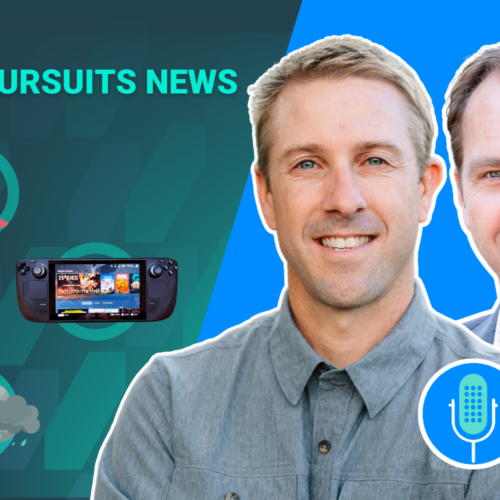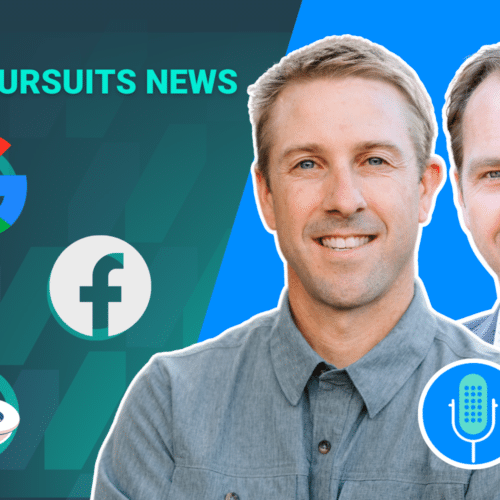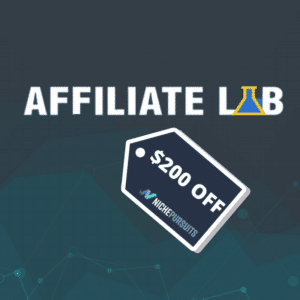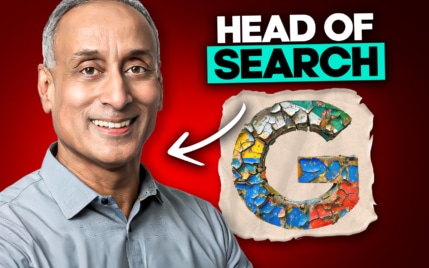How to Perform SEO Tests with Matt Diggity
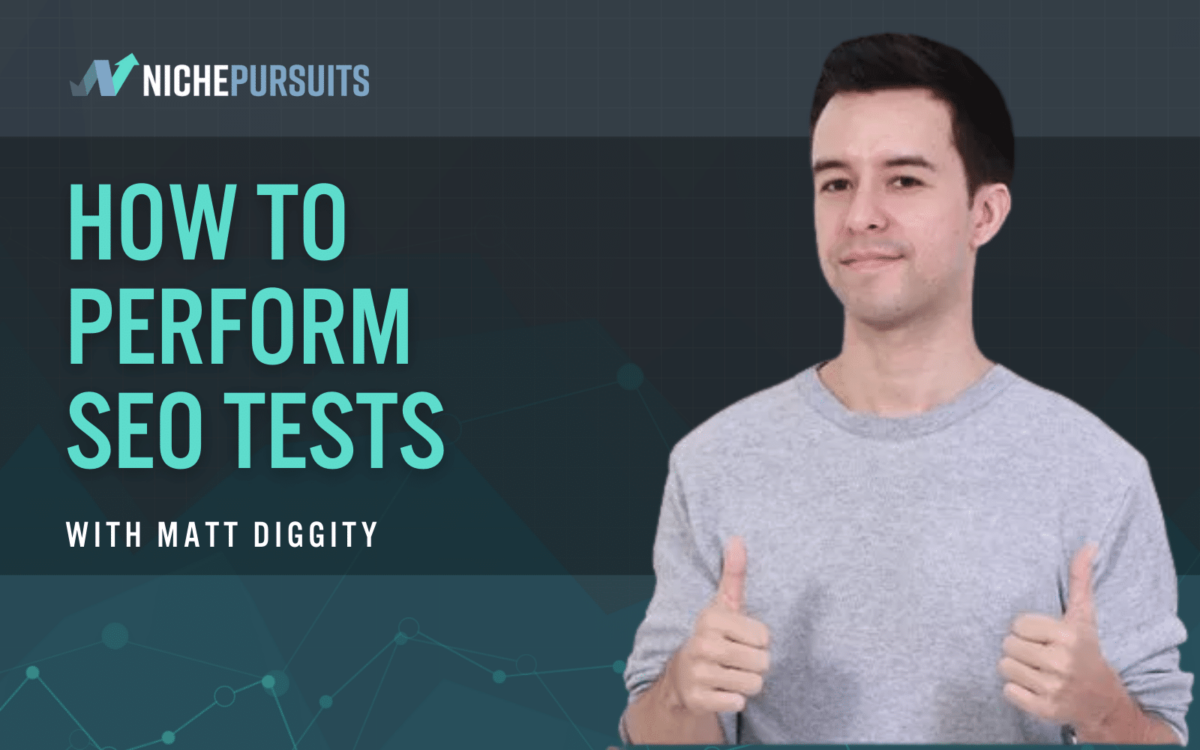
When you buy something through one of the links on our site, we may earn an affiliate commission.
How can you know when you make a change to your website that it's not hurting your rankings in Google?
Well, you can set up SEO tests.
Today, I'm excited to share my recent interview with Matt Diggity where he drops some serious knowledge bombs as it relates to SEO tests, affiliate marketing, ranking in Google, and much more.
This is now the 3rd time I've had Matt on the podcast, and for good reason. Each time he shares exceptional SEO strategies that he's proven to work. And today is no different.
Why SEO testing?
Well, there's a lot of noise in the SEO industry. You can listen to one expert or you can listen to another person and not know if they're an expert. And of course you can try to listen to Google.
How do you know what SEO strategy is the best for your site?
Listen to the full episode to hear some of the SEO tests that Matt has performed and how you can set up your own tests.
A few things that Matt has tested:
- Internal links and anchor text used
- Meta descriptions
- Alt text
- Content length
- Number of images
- Site speed
- and much more
Want to know all the findings from all of Matt's SEO tests? Well, that's why he created the Affiliate Lab.
The Affiliate Lab is his SEO training course that specifically focuses on building, growing, and then flipping affiliate websites.
As Matt performs new SEO test or finds new strategies that work, he adds these findings to The Affiliate Lab for all members to learn from.
In addition, there is a very active member's only Facebook group as part of the Affiliate Lab where you can exchange SEO, affiliate, and other strategies will fellow members.
For a limited time, Matt is offering a $200 off discount for Niche Pursuits readers. So, if you are interested in checking out what The Affiliate Lab is all about, you can get the special discount right here.
Get $200 Off The Affiliate Lab HereIn addition, we talk about some opinions of what happened with the latest Google core update and Matt even walks through my site, OwnTheYard.com and offers some suggestions! Be sure to read on below for all the details.
$200 OFF AFFILIATE LAB FOR NICHE PURSUIT READERS
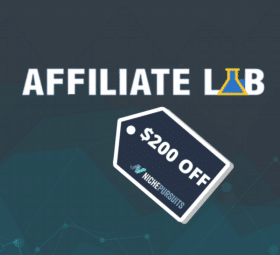
Get A Proven, Test-backed Blueprint for Ranking, Monetizing, and Flipping High-Competition Affiliate Websites.
- 24+ Hours of training
- Templates and Tools
- Checklists and SOPs
- Exclusive FB Group
Watch The Full Interview Here
You can watch the video interview that Matt and I just did where we talk about building profitable affiliate sites, SEO testing, and why he created the Affiliate Lab below.
Thoughts on the December 2020 Google Core Update
Disclaimer, all of this is just guesses at this point. Neither of us know exactly what happened during the last Google core update. Matt is still doing a bunch of testing to see what Google penalized, etc.
So, please be clear that these are just thoughts and are far from a final analysis. Matt and I discussed and here's a few thoughts shared:
- The last Google core update does appear to have shaken up the affiliate industry quite a bit.
- Lots of massive sites were hit.
- With a few exceptions, most sites in the health and fitness niche got hit.
- Maybe Google is expanding what it considers “doorway pages”. Too many ads above the fold or too many affiliate links?
- Importance of links appears to have been turned up even further.
- Larger newspapers, press release sites, and other mega authority sites are ranking for affiliate terms that they really don't have topical authority for.
Matt is currently working with Surfer SEO to run a data correlation study to try and better determine common characteristics for sites that got hit or didn't. So, stay tuned to hear more from Matt and Surfer SEO when that study is complete.
SEO Testing
Matt is a big fan of SEO testing and has been running tests for like 10 years.
A few things he's tested include:
- Alt tags
- Keyword density
- Internal link anchor text
- External links anchor text
- External outbound links and anchor text ratios
- Bunch of external link tests
- Natural language processing tests
- Featured snippet testing
How do you set up a test?
Well, you can start with gibberish pages as an initial simple test. You start with “Lorem ipsum…” or whatever, just gibberish words to fill up a page. And you duplicate across a bunch of pages that you want to test.
Then you just change 1 thing on those identical pages and start to see what performs better.
That works for simple testing.
But then as you move into more advanced testing you might take 50 URLS or 50 websites as a control group that you don't do anything to. Then you take another 50 URLS or websites where you make some changes and then you start to compare results across the group.
This gets more complex and requires more in-depth analysis and tools, but you can find some very interesting results.
One tool that Matt is a fan of for his testing of large sets of data is SEOtesting.com. This tool allows you to use Google Search Console data to run tests on your site and the tool keeps a changelog and clearly shows what's happening to your site after you start testing different things.
I've seen SEOTesting.com around. I've heard good things, but we just started playing with it recently… I was just like, where has this been all my life!?
It's like all this stuff that I was doing manually and calculating averages. It just does all that automatically. It pulls it from GSE and it's brilliant.
Affiliate Lab Review: Why Matt Created It
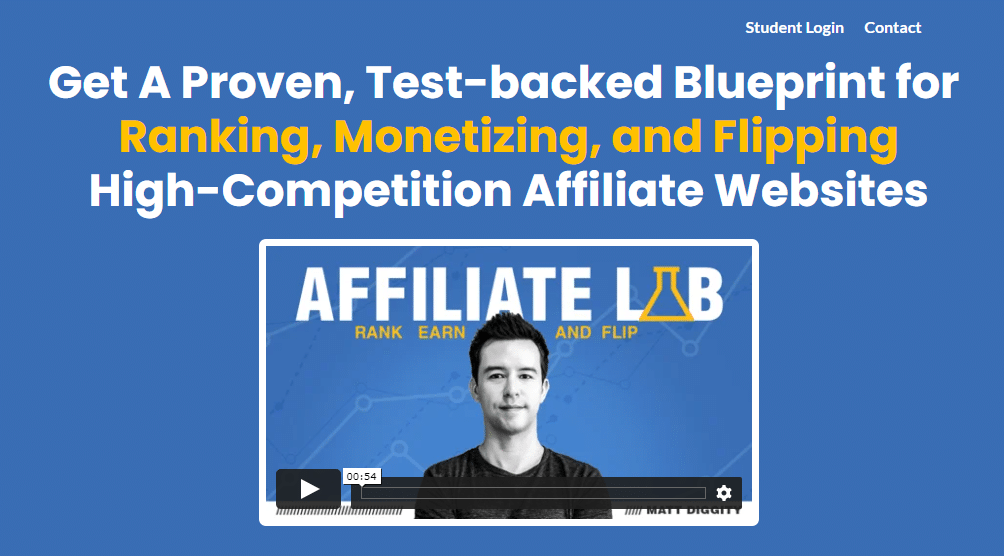
Matt created the Affiliate Lab as a place where he could document all the findings from his SEO tests.
The Affiliate Lab is a SEO training course and an affiliate marketing course that teaches you how to build, scale, and flip affiliate websites. The core focus is on getting more traffic from Google and optimizing your affiliate earnings.
At first it was a training course for his own staff. It was created so that they could implement all the SEO best practices into his websites that these employees were working on.
So, what's in the Affiliate Lab?
Well, Matt was kind enough to give me access to The Affiliate Lab so I could see exactly what was on the inside.
When I logged in, I first realized that The Affiliate Lab actually comes with several “bonus” courses. You are not just getting the affiliate lab, but you are also getting the Website Flipping Masterclass, the Email Outreach Masterclass, The Featured Snippets Masterclass, Conversion Rate Optimization Masterclass and much more.
Check this out:
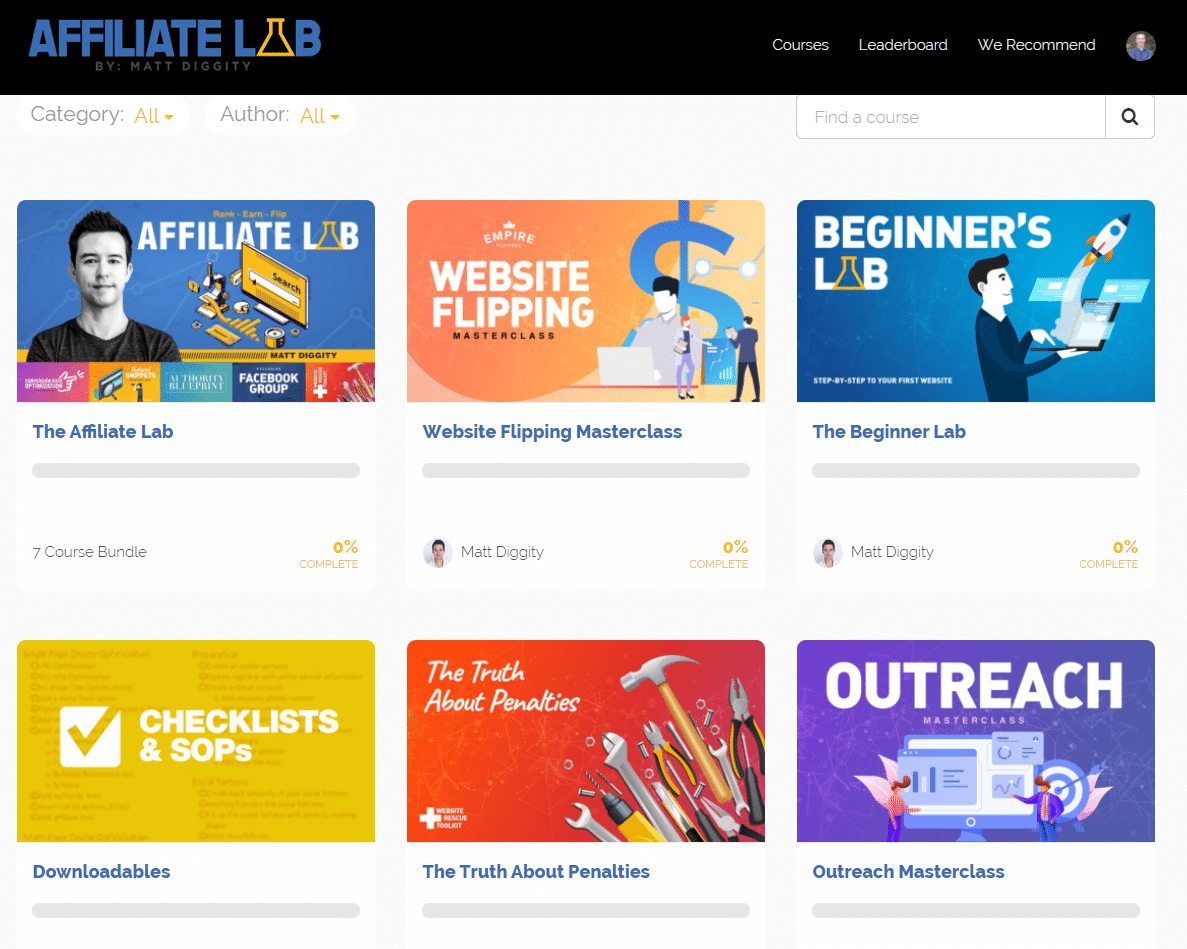
In total, there are 8 courses (Affiliate Lab + 7 Bonus “courses”).
First, let's take a look at what's inside the Affiliate Lab, and then I'll show the inside of a couple of the other “bonus” courses.
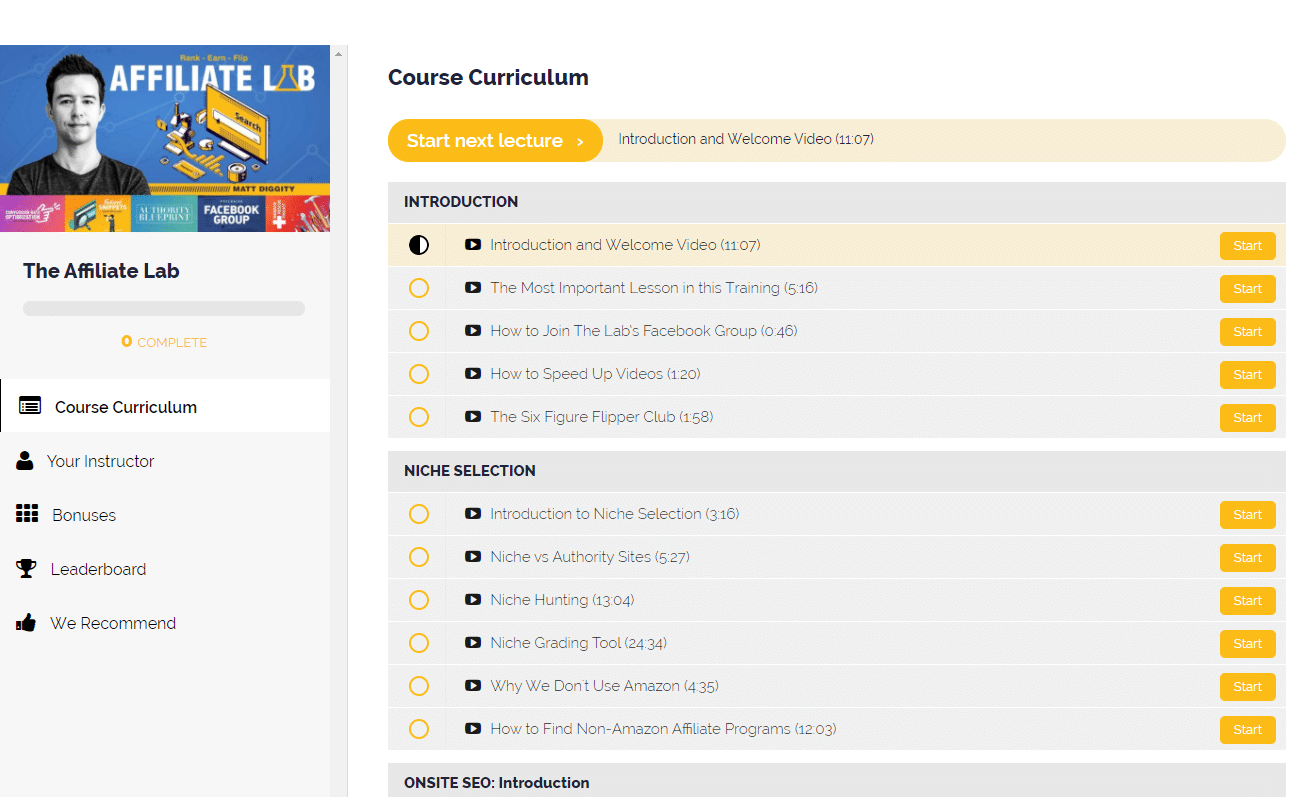
As you can see, the course is laid in an easy to use format (on Teachable).
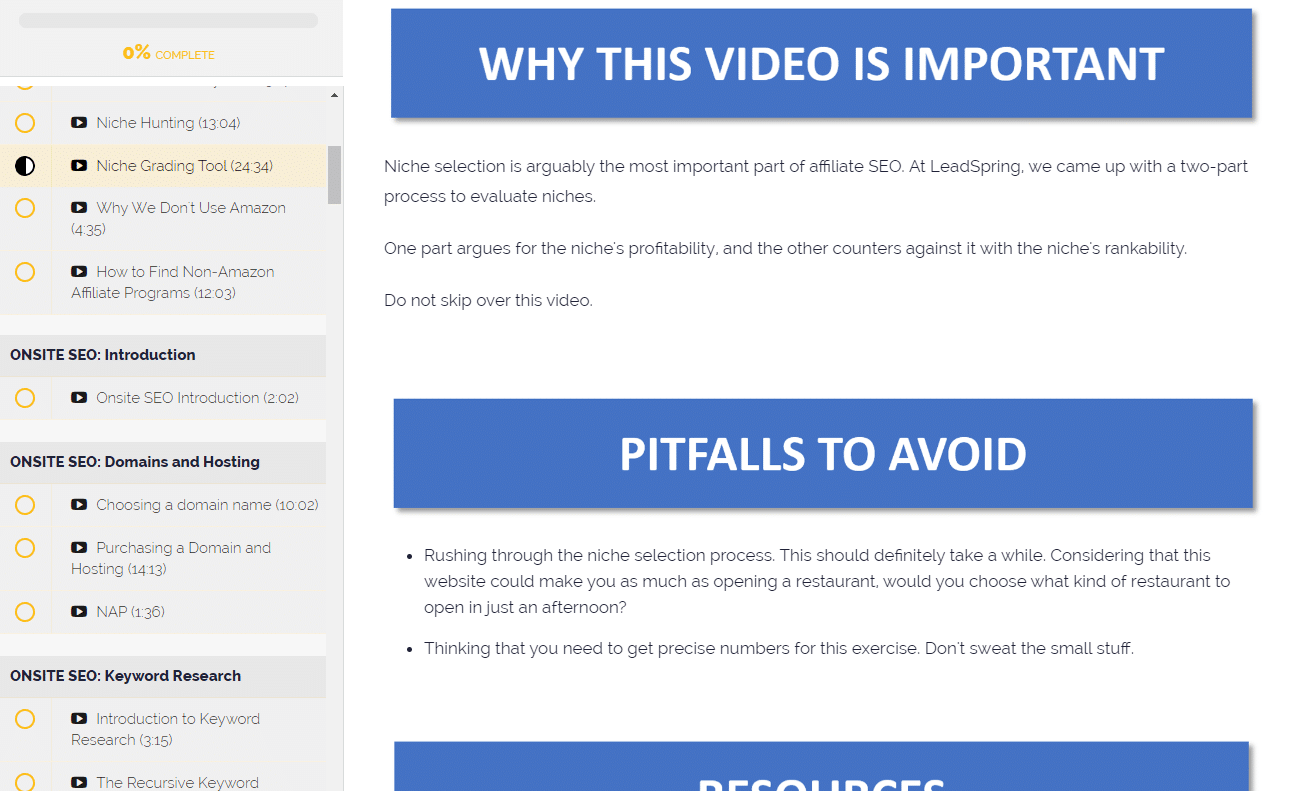
Each module comes with a full video training along with a written summary of the training.
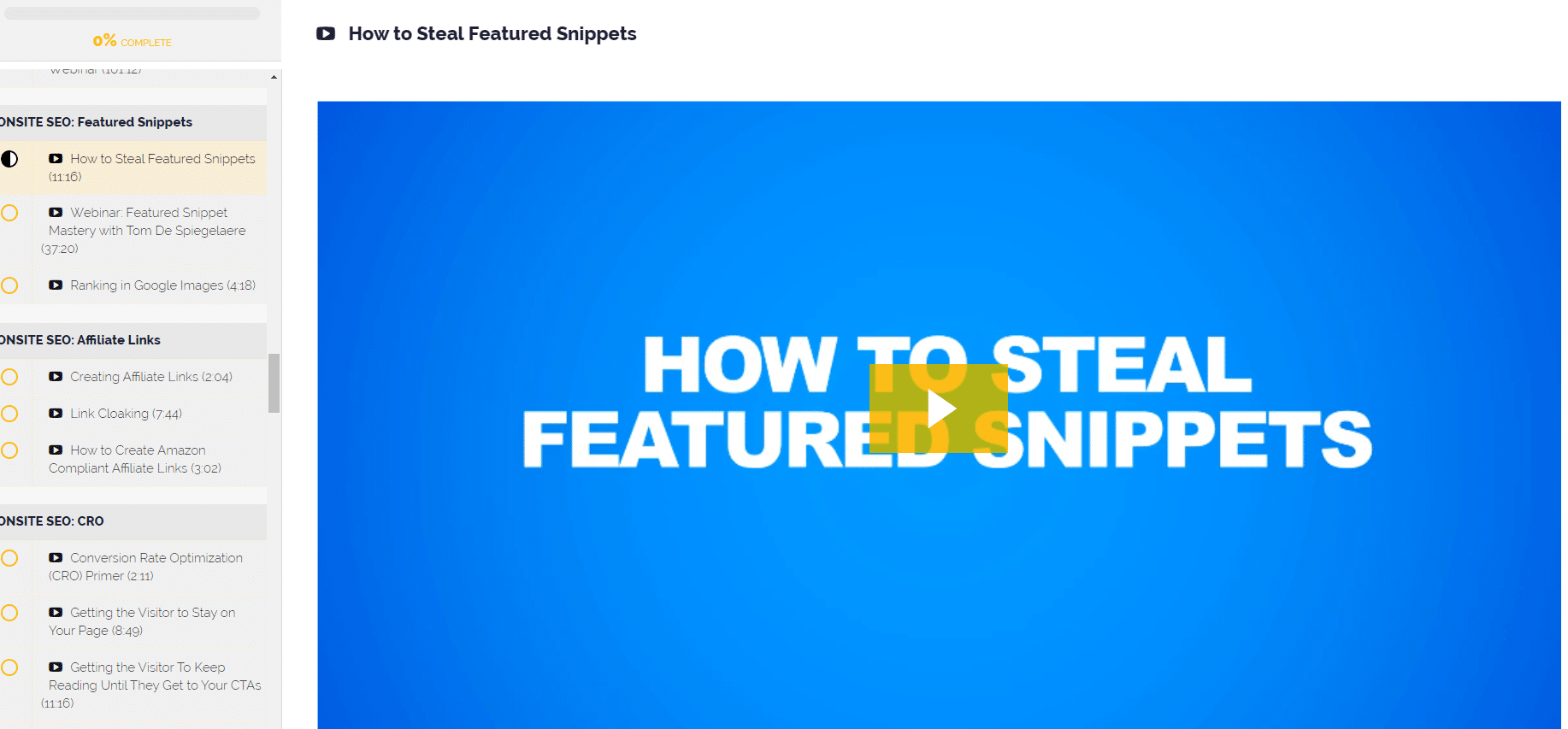
I found lots of really interesting modules, like this “how to steal featured snippets” training that are pretty unique.
Matt is someone that has been building affiliate sites for a long time and he doesn't hold back in the affiliate lab. I'm confident in saying that it includes everything you would need to know to either build or buy an affiliate site and then scale it using these methods.
Watch the video below to get an entire walkthrough of everything included in The Affiliate Lab.
If you are interested in checking out the Affiliate Lab, be sure to get $200 off through this link here.
Get Access to the Affiliate Lab Here$200 OFF AFFILIATE LAB FOR NICHE PURSUIT READERS

Get A Proven, Test-backed Blueprint for Ranking, Monetizing, and Flipping High-Competition Affiliate Websites.
- 24+ Hours of training
- Templates and Tools
- Checklists and SOPs
- Exclusive FB Group
Read the Full Interview Transcript
Spencer Haws: Hey, Matt. Welcome back. It is time. Number three. You're on the show. Once again,
Matt Diggity: always a pleasure. Glad to be back. Thanks for having me.
Spencer Haws: Yeah, it is a super great to have you back. Like I said, this is the third time in just a little over a year. I think. you always have great things to share. I know that the last time that you were on, we talked a lot about expertise, authority, trust, and link building strategies.
And, got a lot of really great feedback. People love the very specific strategies that you shared and, so wanted to have you come back on and see if we could, squeeze any more, strategies out of you, any, any more SEO wisdom. And so that's why we're back. we're excited to have you.
Matt Diggity: Happy to help
Spencer Haws: let's do this.
Yeah. So, first of all, how's everything going. I know. you know, I'm trying to remember how long ago you had your first child families growing though. How's everybody doing?
Matt Diggity: Everyone's doing great, man. So we got a daughter she's 10 months old, you know, she's, she's babbling, she's learning how to stand.
It's super exciting. And like I was mentioning before we turned on the record, I'm down here in Cosa, Malaysia, Thailand, right on the beach at a nice little Villa with the family. There's much SEOs here too. So there's like a new SEO community around here and I'm just like on fire right now. I'm loving life right now.
That's good. Thanks for asking, how are you doing. Yeah, I I'm
Spencer Haws: doing good. you know, not a whole lot has changed. It's it's kind of interesting. We're in Washington state, which is, we're, we're not really open, like a lot of the other States. so all my kids are still. On zoom doing school. They're not in person doing school or anything like that.
been almost a full year now. And so that's presented challenges, but we're in a groove now, you know, it's just sort of a, one of those things. I got four kids at home and, luckily I've got a dedicated office space here in my basement that, kids don't come down here and, bother me too much. So, but yeah, everything's good.
I'm actually, getting back into my groove of. Getting out and running a little bit more every day and exercising and feeling good. So thank you. Yeah, I hear that, man. Yeah. So let's jump into some SEO, you know, since we did our last podcast recording, which was, we released it, I, it back in October, which is for listeners, you know, whenever they're listening, it's a few months, Since then, and Google had a huge update, the December core update and that impacted a lot of sites.
you know, it seemed like I've heard a lot of chatter, either good or bad in the affiliate community. And I just thought, I'd give you a chance to share any thoughts, you know, like. We, we certainly don't know, what causes everything, right? Like Google changes things. And we, we do our best to kind of understand why some sites increased, why some sites decreased.
But what are your thoughts? Have you noticed anything as to, yeah. What the changes were all about?
Matt Diggity: Yeah. So I'm still in theory mode. Of course. And I, I, I see a lot of people. Go out there and they want to make a statement real quick about what happened with the update. And then there's a hundred flaws in it and they want to retract that.
I don't want to be that guy. I want to make sure if I come out and say something about it's backed by a ton of data. And I, I, I get what you're saying. Like, as you were saying, it does seem, there was a lot of shakeup in the affiliate community. And when you're asking people, anecdotally, I find it very hard pressed to find anyone who said I just across the board saw gains the whole way.
I think that's pretty darn rare. A lot of the times, if someone just, just stayed flat, I consider that a win in the last update, Nerf, if you're an affiliate site and I've seen so many gigantic sites just get absolutely bulldozed and especially the big, big ones, like you're hungry. Best of machinery improv.
Like these are all the ones doing six figures a month, then they just got smashed. So I went down the rabbit holes thinking, you know, maybe Google is going after affiliate sites in some way. And it, I wouldn't say they're going after affiliate sites straight up because we have winners all over the place.
You know, like we have wire cutter. That's doing well. We have, health lines and affiliate site too. So. Not all affiliate sites are getting attacked, but there must be something, some kind of characteristic about some affiliate sites that are allowing them to get hit. And potentially the way the angle I was looking at this with is even in Google's terms of service, they are against doorway pages.
So the doorway page is just a way to get a search to a landing page and then as soon as possible to something else without providing any value in the middle. So I've been looking at various things that might. Show a footprint of being considered a doorway page. Maybe it's affiliate links above the fold, or maybe it's ads above the fold, or maybe it's a whole bunch of different things.
And I've been running a correlation study behind the scenes with surfer surfers, doing a big crawl over hundreds of thousands of affiliate websites. And we're seeing some patterns. I just don't want to commit to anything yet, as I said, right. So that's, that's the main angle on down other things I've seen and you can tell me if you've seen the same, like.
They seem to have turned up the volume on how important links are again. Right. I don't know, what niche, well, I do know what niche you're in, but depending on your niche, I'm seeing a lot of like mega authority sites and even press release sites, newspapers, medium.com ranking for affiliate keywords with no topical authority in there.
They're just ranking because of their links. Do yourselves a favor and Google, VIG RX space review. That's a boner pill. That's a Viagra pill review. And you're going to see some, what the hell are these guys doing their ranking right now? It's just because their authority. And then, yeah, the last thing, this is my theory, but, Eric Landry's smart guy.
He does a lot of data correlation study type stuff. He's got a theory. I don't want to spoil his reveal or whatever, but he's looking at foreign back planks and he's seeing that there's, there's a devaluation of link equity, but you don't have to talk to him to dig into that good guy to have on the show.
If you haven't already many smart.
Spencer Haws: Yeah. So, a lot of things are going on it's it's hard to like pin down and say exactly what that is. when do you think that study that you're doing kind of jointly with surfer? SEO will be ready to be talked about
Matt Diggity: not sure, man. So we talk every day and apparently this crawl is very difficult to do so, we're trying to just.
Look and see, can we take some shortcuts and not have as much data or can we spend more money and get it done quicker, but it's a very difficult core crawl, to be honest. Yeah.
Spencer Haws: Yeah. So, yeah, it's tough. I mean, like with my sight on the yard, which most listeners are aware of on the r.com, like I've seen, some.
Keywords, do worse than others. you know, like some of my very specifically best XYZ product, right? Like those seem to be the ones that maybe are ranking lower. And a lot of my informational articles are doing great, increased. Right. and so it's it just at least what I'm seeing on that one site, it kind of just depends on the query itself.
It wasn't really a site-wide thing. Right. And so. For what that is, right. That's that's one site, but, there's a lot of data to crawl through to really figure out what's going on.
Matt Diggity: And to that point, right? It's like Google just said the, the informational type of your site is great. We're not too sure about the affiliates part of it, but, but what is it?
That's what I'm interested in, figuring out what it is about the affiliate part, because some tons of affiliate sites did go up. And yeah, we're finally starting to hone down to find out what were the characteristics of the sites that went up versus the sites that went down.
Spencer Haws: All right. Very cool. Well, if we have any of those findings, by the time we hit publish on that, we'll maybe update, the show notes and that sort of thing for listeners that they can check out.
but let's sort of shift gears here and not shifting too much because it really is a similar topic in terms of trying to figure out what Google is changing, how to make sure that you're, Your site is performing the best as possible and really testing out different theories. And that's kind of what I wanted to shift into now is like, what are some SEO tests that can be performed?
And I guess specifically, let's start out with like, what type of SEO testing have you done on some of your sites in the past?
Matt Diggity: Sure. So when I started SEO in 2009 and starting to get a little bit more depth in 2010, I remember having a website in the ergonomic chair niche, and we, I was trying to rank a page for yoga ball chairs.
You know, like those yoga balls you sit on and like keeps good posture and stuff like that. And no matter what, this, this page. Wouldn't rank. And I was looking following best practices at the time and looking to see, okay, I've only written the words, yoga ball and chair on the page or yoga ball chair on the page, like four times.
There's no way of overcooked it. And I got some advice from a guy at the time, you know, when you're a newbie, like you just need to, you need some kind of mentor. So I, I hit up some guy. I was like, what the heck, a problem here? And it's like, well, yeah, you're not over-optimized for yoga ball share, but have you looked and seen how many times you've written a word yoga on the, on the site?
So I I'd talked about the word yoga by itself, like a billion times. So it just, it just crossed my mind. Like I'm an engineer by trade. I'm an electrical engineer. I got a master's degree. I did this kind of testing stuff all the time. Single variable testing. Why don't I start applying it to my SEO? And so these are some of the first kind of simple tests that I would run.
So like single word keyword, single word, keyword density. Yeah. It matters like in my newbie brain at the time, I thought like Google, like it looks at things and keyword phrases, but yes, they'd look at single words as well too. And you can definitely overcook that. I started looking at simple stuff like, you know, does, does all tags do all tags?
Can you optimize that for keywords? And do they read that? Does that contributed to keyword density? Yeah, the anchor text stuff, all these like kind of simple things where we're kind of figured out the beginning of my career. And then I started moving on to like more, more interesting stuff and more experimental things like internal anchor text, which you'd probably be pretty interested in, like, what's your optimal.
what's the optimal way to optimize internal anchor texts to a given page. So we've, we've experimented around with going to a hundred percent target anchor text, 80% target anchor text 20% miscellaneous 50 50 and stuff like that. Spoiler alert. The answer is a hundred percent target anchor text varied up, not exact match over and over and over and over again, but varied up 100%.
It gets the best. Hm. And then 80% target anchor text, 20% miscellaneous gets a little bit, a little bit worse, not that much worse. So we actually decided to go with 80 20 just because you don't risk any kind of over-optimization just because the results about the same. And then, so now, now I'm looking at stuff like it's, it's much more complex.
I feel like I got my, my basics down. I feel like I truly understand like the fundamentals of the algorithm, what is what isn't a ranking factor. So we're trying more complex stuff like combining digital PR campaigns and making things viral, falling into that up with massive amounts of backlink campaigns.
And. stuff like, external outbound link ratios and how that affects page rank, just whole bunch of different stuff. And it it's part of my job as the CEO of the company to first formulate these tests, come up with them and then. I also run a testing group with some smart people and we share, and we combine our results together.
So it's, it's fun. This is the funnest part of SEO. To me,
Spencer Haws: it's super fascinating because, you know, there's well over 200 ranking factors that Google has. w we, we know them generally. We don't know all of them necessarily individually. And so there's at least 200 different things, technically that you could be testing out right.
Individually, like you mentioned a lot of those, And so for people that maybe want to try and set up an SEO test, like how do you go about like setting up a test and you know, some of the basics of how do you actually determine a winner what's working, what isn't, so that you actually know at the end of the test, like you have reliable results.
Matt Diggity: So in my experience, there's two ways you want to go about it. If you're testing simple stuff, like. Do all tags contribute to keyword density is the alt tag spot for keywords as a ranking factor. For example, then I would, I would recommend checking out Kyle roof's stuff or, Clint Butler does this too.
That's they, I forget the name of the group, where they do a dump bunch of testing stuff and they share results. But yeah, like all the simple stuff, the kind of tests you want to do is called jibberish word testings. So you take a single website, you make five different pages all with just jibberish words.
So. Blah, blah, blah, blah. Just like lorem ipsum type stuff. That doesn't make any sense. So when you have five identical pages, you could test to see whether all tags are ranking factor by inserting this particular word that you want to rank for in the alt tag. And hopefully that should go to number one, if all tags are a ranking factor, so that one's like really, really good.
I can't think of a better way to test. If you want to test simple stuff, that's. That's kind of just like a single ranking factor, not how a combination of things work together and stuff like that. Or anything related to conversion rate optimization or user metrics. This is terrible at that because there's no users going to these kinds of jibberish pages.
Of course. Right. And then, yeah. the other method for testing for you're more, you're more cutting edge stuff. If you're trying to invent new techniques where you're doing more complex things and especially related to CRO use metric stuff is you want to use. Test groups. And you want to make a, I don't know what to call this, but I call it like large average testing.
So you would make a control group of 50 euros, 50 URLs. This is just a set of URLs where you're not going to do anything to it at all. And then you're going to take an experimental group, another 50 URLs or 50 websites or 50, whatever it is. Where are you going to apply an external stimulus to, so maybe that's a new backlink technique or this recent test that we're running right now.
And then we're waiting for the results for is we're reducing all the outbound internal links on a page from whatever they're at 15 down to one. And seeing if that increases rank, because it's not leaking any page rank, stuff like that. So what you can do here is you apply the stimulus to the experimental group, and then you're looking at the average increase in ranking or decrease in ranking or increase in traffic, decrease in traffic, on the experimental group versus the control group benefits of doing it.
This, the second way that I've described test is. It's core algorithm like proof. So algorithms have algorithm updates that happen all the time, but it's going to happen to this entire set of everything it's going to happen to all 100 URLs involved. So these are all move up or all move down or something like that.
So you still could be looking at the average. I can't tell you how many times I've had like two or three month ongoing SEO test going, and then a core algorithm update comes out and just completely runs everything. And I have to start over. Right. If you're interested in this kind of thing, I just found out about it.
I mean, I seen this around on the streets and stuff, SEO testing, the.com. the owner, Nick mom reached out to me. He's like, Hey Matt, I want you to check out my tool. And it was like, you know, I've, I've seen it around. I've heard good things, but we just started playing with it recently. I was just like, where has this been?
All my life. It's like all this stuff that I was doing manually and calculating averages. It just does all that automatically. It pulls it from GSE. And it's brilliant. Yeah.
Spencer Haws: Kind of be my followup question is what, what tools do you use? Because that gets really cumbersome to be looking at a hundred different sites, or even a lot less than that.
If you're looking at multiple factors and tracking all of that. And so. I guess one way would be, like you said, Google search console and maybe trying spreadsheets or something. I don't know. but what other ways you just mentioned SEO? test is SEO testing.com. yeah. And then, yeah. W why don't you talk to that?
Just any other tools or ways to sort of gather and read the data?
Matt Diggity: Well, up until SEO testing.com, I was just. You would go in and you would calculate, okay. If I had 50 different URLs in the experimental group, I'm going to look at, I'm going to track individual keywords for these guys. And then I'm going to see what is the percent increase in ranking on each one of these pages.
Then I calculate the average percent increase ranking in the experimental group versus the average risk control group. And it's just like, I'm doing this all by myself and it's it doesn't take into consideration traffic. You can only look at like actual keyword rankings. And those can get upset by like he would cannibalization external signals, stuff like that.
Now let's see. Testing is just looking at exactly and pulling the data from GSE. So it can just try of, see, you're getting more impressions. You're getting more clicks, this one. Yeah. And average it all together. And it shows you trend lines and stuff like that, where the experimental group and the control group start to diverge.
So, you know, things are going correct.
Spencer Haws: very cool. So you would, you would think that by now, like shouldn't SEO experts, if you will, you know, people that have been in the industry for a long time, shouldn't we know all of these things like that, you know, Internal links help that all tags help that, you know, link building helps.
Right. I guess where I'm going with that is, is there some place that either you have, or a resource like that you've accumulated all these tests you've done or test that other people have done that. If somebody, a listener, right. Is to, it's over their head, right. Honestly, to do all these tests themselves, even, probably for me, I'm not sure I'm going to go out and get a hundred URLs and do all these tests.
Like, can I just read all the data and like get the findings somewhere from all these tests? You've done.
Matt Diggity: Sure. I mean, for, for me personally, that's why I created the affiliate lab. So affiliate lab is my course. For it's an SEO course. It's also an affiliate marketing course and how I combine them together to build affiliate websites.
And I made the affiliate lab as a training course for our own staff. So when I was onboarding people to join our affiliate agency lead spring, we wanted to have a course where we can just plug them in and we didn't have to sit with them all the time. And, like individually train them. So everything that we've learned and everything that we consider to be Canon, so to speak what works in SEL is in the lab.
And that's, that's where you would my stuff. Right. I do completely understand your point on, like, why isn't this stuff like common knowledge. I think like, A lot of it is, and there's a lot of good testers out there, but there's so much noise in the industry. You know, that there's a subset of the industry.
That's like, yeah, this is the real stuff. SEO knowledge. And then there's the guest CEO, which is like, GHESKIO is 90% of the industry. So imagine you coming in as a newbie and how many different perspectives you would have on interlinking, right. Just totally that one subject. Yeah.
Spencer Haws: Yeah. No, I mean, that's a good point.
I mean, you have people that are, that are genuinely trying to share what they're finding and, and. You know, hopefully I'm one of those. I blog my results of, you know, my public case study. You share on the affiliate lab, what's working for you. but other people may be are, they got lucky. They built one site, you know, in six months it did really well.
And then they put together a course and say, this is, this is gospel. And this is what works in SEO. And you don't know if you're finding that guy or you're finding the guy that's really done all the testing. If you're brand new to the industry, like you're saying, so, it's hard. There is there's, there's a ton of noise, out there and Google isn't super forthcoming with, you know, their algorithm.
Of course you got John mew that sort of shares somethings, but you have to interpret what he's saying anyways. so yeah, I totally get it.
Matt Diggity: yeah. Yeah. Even like Google patents, you could read the patents, but you have no there just because it's the patent doesn't mean they're using it, right. It's just a Pat.
This means here's a technique that exists. Doesn't mean this is actually implementing the algorithm today right now, or even what portion of it is. And we have, you know, like a lot of people just like to speculate and. Now they might have a couple of clients and stuff and they publish a blog and they think, you know what?
This, this one pattern they've seen on one client is the way it is. But that's, that's not the case. Right? You, you can only trust test results, to be honest. That's the only thing that you can believe in SEO space.
Spencer Haws: Yeah. So what kind of results have you seen? You've done lots of testing over the years. you know, you've kind of found out certain things.
yeah. What, what results have you seen? Like what's maybe one of the, better results, if you will, just as an example of something that you tested, you found out, Hey, this works and then you're able to apply it and see some results,
Matt Diggity: man. okay. Let's see, putting me on the spot. So. Well, one of the most significant tests I did in 2020 was, we were playing around with the NLP and NLP is natural language processing algorithm.
And it's just the way that Google takes awards in the page and converts them into vectors. And how does it figure out what the content is about? And we realized that, you know, like to be able to decipher English texts is a hard job. So we had this idea to, and we, we took borrowed some ideas from some content we read somewhere else.
That if you make life super easy for the crawler to figure out what you're talking about, they might reward you. So we started to insert very specific NLP friendly texts into our pieces of content. So if the question was what's the best temperature to brew beer or the query best temperature brew beer.
We'd echo the question back. Give the answer and then given any associated units that go with the answer. So we replied back or we put in the content, the best temperature to brew beer is 103 degrees Fahrenheit. Right? So we started doing this in all of our content and pretty much every query. Has like some kind of like format like this.
So if someone Googles best botchy ball, right, you would write in our opinion, the best botchy ball is this right. And this one, this particular change and implementing this across the sites, not only did this results in increase in rankings, but a huge adoption of featured snippets because it's a nice consort.
Short concise answer that. There's no doubt in Google's mind that you answered it, whether or not you got it correctly, that's a different story, but you definitely answered it. And there no doubt about
Spencer Haws: that. Right. That's what I was going to ask about is the featured snippet. Cause it sounds like that's, you know, sort of the perfect thing you're shooting for there is.
What are they typing in? And if you're going to have a featured snippet, what's the one or two sentences you can include there. the Google can use as the featured snippets. So if somebody were to try and kind of implement that, just to follow up question, is there a specific place in the article that they need to include that is, do they need to use an H two tag to sort of ask the question and then answer it?
any additional like tips or is it just as long as they're including that very specific sort of query and then the answer. Somewhere, you
Matt Diggity: got my Achilles heel. So, because I'm so dependent on testing, I haven't tested that, but I don't have a comment on it. I don't know the optimal place
Spencer Haws: just as long as it's in there somewhere.
Yeah.
Matt Diggity: We just drop it in the content somewhere. But the ideal place for it is like, if it's best botchy ball for the best basketball set, I don't know what they come in, their sets or something. You, you would have that like on your first listing. So listing number one, the fun Plex 200, in our opinion, this is best watchable set of 20, 21.
Something like that. Totally.
Spencer Haws: Yeah, no, that makes sense. And so, kind of, kind of talking about that, we talked, you mentioned botchy ball. That's something that I write about on, on the yard.com. And so, I'll be honest. I haven't done a ton of testing. I have done a little bit, actually I've done some AB testing with like, affiliate tables, right.
Just using like a WordPress plugin to AB test, which one's getting higher click through rates and that sort of thing. It's not really an SEO test though. Right? It's more just a. Try a monetization test, right. To get more clicks on my affiliate links. So if I were to, or if you were to look at on the yard and sort of think about what what's an SEO test that Spencer could be doing on that site.
just for the benefit of me, of course, but also the listeners, right. If they've got a site and they're trying to figure out what do I test? Like, like what's something you would look at and consider an SEO test. to do
Matt Diggity: breaks. So I anticipated this because you told me this question might be coming. So I, I did have to take a look at your site.
So one thing that I might try doing, I don't remember exactly what color your CTS are, but I think your website's blue, green,
Spencer Haws: or blue. Yeah. They're, they're usually green or blue.
Matt Diggity: Okay. So try swapping your CTA colored orange. It's just. It's complimentary, complimentary, but opposite from blue. And it's going to pop off the page more.
I suspect a little bit of an increase there, but a huge increase for in terms of monetization. I shit, you not. I told someone else about this and they implement this and they double their earnings. So look at your Amazon buttons or your call to action buttons. I believe they're like check price on Amazon and just remove the word Amazon and just say, check price, check later price or something like that.
Because when you tell people where it is, they'll take a, an, I know what Amazon is. I'll check that after work. No, or, Oh, Amazon. Yeah. Yeah. I was planning on browsing through there tomorrow, anyways, so I'll check that out, but you don't get the cookie when they do that. Right. We say something like check current price, check, latest price.
That also implies that this, this price that it's at right now, it's not going to be there soon. So you need to click this to find out where to get it and how much it's going to be. That's super interesting. Okay. A couple of seats. Yeah, let me know what happens. I'm going to try that as far as I know, like there's no requirement that you have to use the word Amazon on the call to action buttons, but this is Amazon we're talking about, and that could be a complete lie.
SEO wise. I did. Okay. So the only thing I thought, and I look at your site was on your homepage. I see you have like at the bottom, there's the latest post and then it gets, it's just. It, it shows like nine of them. And then you get into pagination mode. Right? I think that I would consider, like adding categories, like subcategories onto your homepage so we can reduce the amount of, Like link jumps to get to some of the pages, because some of your oldest posts, the li the crawl depth might be super long skid from the homepage.
Yeah. So maybe creating like games, page, swing sets page, or like a barbecue page category page, and then link to those directly from the homepage might improve your link juice flow. Right.
Spencer Haws: And then on those pages, like, make it big enough. So it could include like all of the category in the backyard games category, for example,
Matt Diggity: Yeah, exactly, exactly.
Want a good example of this? like good to like Matthew Woodward's website. Like he did a good job in his redesign of creating category pages and then you can link build to those two and it spreads it around. Pretty good. Yeah.
Spencer Haws: Yeah. Yeah. That's a good idea. I'll check out that site. yeah. Matthew Woodward.
Does good stuff over there obviously, but, yeah, no, I'm going to try out that, the check Amazon and I will look at my homepage, and I'll have to consider yeah. Other, sort of, I would be really interested in seeing your internal linking. Sort of testing. I know you kind of gave the final results there, but, any, any more data you have, that would be interesting because I'm just wondering if I could implement that somehow in link whisper sort of if nothing else in training, right?
Like that the optimal internal anchor text is this or whatever. So,
Matt Diggity: I've I feel I'm back to the drawing board on that one. So like in terms of ink, in terms of the anchor texts, like I'm, I'm very. I'm very sure that you want to go target and then varied as much as possible, but in terms of like quantity, right?
Should, should we be very sustained and only link certain pages to each other that are very tight in the cluster together? Or can we stretch relevance? Right. And if you would have asked me on December 4th, 20, 20, what I thought I'd be like, you want to interlink as much as possible because this is me looking at.
Mega mega sites. If you look at wire cutter, if you look at gear hungry, if you look at all these guys they're interlinking like crazy. So like their best espresso maker article is getting internal links from like how w what, what to do when you wake up in the morning. Like nothing that has to do with coffee, but just articles on like also the best razor.
So. And they'd have a sentence that's like, so after you make a shave, you're probably gonna get a class of coffee or something like a cup of coffee and just finding a way to make it work so that I was just seeing in action. Like maybe these sites are just rocking it so hard because they have so much topical relevancies have thousands of pages on the site and they're just all linked into each other.
But these sites tanked the hardest in this last update. They're all dead, man. They're all dead. So I'm back to the drawing board. I'll let you know what I figured out. Yeah.
Spencer Haws: Yeah. And it's, it's so hard to know if, if like the internal linking was a big part of the reason or was it something totally different?
Yeah. It's it's, it's crazy. So, I guess that's what keeps the industry interesting, right? Is that, there's always. Changes for good or bad. It gives us, you know, heart attacks, things are always changing, but, it also gives us a lot of opportunity. I guess, if you're able to stay on top of the changes, you can make some moves that maybe slower movers, aren't going to make to their sites.
So we'll, we'll take the gun off the bat. I guess. That's fun. Yeah, definitely a lot of fun. So I do want to talk a little bit more about the affiliate lab. you talked a little bit about why you created it. You're really kind of taking all these tests that you're doing. you've put it in sort of a training format originally for your team members so that they could, you know, learn your best practices and that sort of thing.
And now you sell that for others, that, that can purchase that. I mean, really who is the affiliate lab for? I mean, what's kind of the. ideal person that should be looking at, joining the affiliate lab.
Matt Diggity: Can we try to make it accessible to everybody? So it's, it's one of my biggest life missions to help provide freedom for people like being an engineer.
I was, I was absolutely miserable and my desk 60 hours a week. So a big part of me feels like I get my personal value from. Helping people escape the rat race. Right. So it's set up to be super beginner friendly. We have a complete bonus add on to it called the beginner's lab, which takes you from the beginning, like how to install WordPress, how to register domain name, all that stuff.
That's, you know, like really, really basic stuff. And then on the other hand, like I'll tell you straight up, I'd much more rather talk about super advanced stuff. So. I'm a nerds nerds too. Like I want to talk about the nerdiest stuff possible. So that's, I think that's why I at least a huge chunk of the member base is some of the, the best SEOs.
Like if you look in the Facebook group, these guys are killers. we have this group called inside the affiliate lab called the six, six figure flipper club. And we have like 44 members now, people that have flipped sides for over six, seven five-year sentence, some spots. Awesome.
Spencer Haws: So what's everything that's included.
I mean, it sounds like you've, you've got the beginner lab. So even somebody that is looking to maybe just set up WordPress and get started, but maybe walk through some of the major either modules or just kind of, you know, what, is there like a core, what, what would you say the affiliate lab does best?
Matt Diggity: Well, we got the core content, right? And that gets into, you know, highly pick a niche from front to back and how to do on-site SEO, which involves keyword research, building pages, connecting your site together. Interlinking site architecture we get into backlinking. We, our main track is how to do an outreach white hat based approach, but we do offer some insights into how to run a gray hat approach as well.
And after that, so we get into, like right now, we're rolling out a huge module and scaling. So how to hire contact or content editors, content writers, link builders, project managers, like it's all about hiring delegation management. We've gone into email marketing, so a complete module on how to set up an email marketing funnel and make that profitable, even run paid ads and made that profitable for an affiliate site.
authority sites. Of course, that's included as well. This isn't apply just to niche side. So all the way to authority sites. Man. So like it's gotten insane when we first released the, the affiliate lab is 12 hours long. It's 40 now, because at the beginning I made a promise. Yeah. I made a promise that every single month, if anything happened with the algorithm or any of the concepts changed, I would go ahead and edit that part and figure out what's working.
And it would be an evergreen course. Right. And if there was nothing new with the algorithm and just going to release a new module or something new and tack something on. So it's become this absolute beast man. Like, like I mentioned, 40 hours, like if you finish that in a, in a month, I give you an award.
Spencer Haws: Yeah, yeah, yeah. That's a lot of content for sure. so when, when did you, originally launch the affiliate lab? Just curious how old it is.
Matt Diggity: so the first incarnation of this was I think in 2017 to 2018, it was called the lab. And this is a collaboration between me and Mark, Bob, Brian, Willie, and Dino Gomez.
And I was covering affiliate someone else's local, someone else's maps and someone else's Facebook ads. And then since then I've pulled or the lab got into flight and the affiliate lab boots on, I mean, I made a promise for this to be an evergreen course. So keeping the promise. Yeah.
Spencer Haws: Yeah. And it sounds like you're certainly doing that.
I mean, if you're adding new modules, you have to 40 hours. I mean, that's, sounds like really the, sort of the latest, all of the strategies that you've implemented, you know, growing your sites, it is there and then there's the Facebook group. It sounds like as well that people get access to where they can chat with other students, or you and ask questions, that sort of thing.
Matt Diggity: Right. Yeah. A lot of people say the Facebook group is worth, worth the price itself. So I mean, yeah, I'd have to say that's the thing I had the most pride over is like the group of people that are mass in there. These guys are. So good. So yeah.
Spencer Haws: Yeah. Now it's actually funny and I didn't give you a heads up.
I was going to ask this, but, I just was, was jogging on the treadmill before our interview here, getting some exercise in, watching YouTube and believe it or not, one of your YouTube ads showed up for the affiliate lab. They targeted me pretty well. You know, you got me. I don't remember what video I was watching, but, so I, I see that you are running some YouTube ads.
for the affiliate lab, I'm just curious how it's going. Like how, how are not necessarily just the ads, but how's the marketing and how's the affiliate lab business itself doing
Matt Diggity: Philly. Let's see. So the YouTube ads and like the Google ad type stuff, this is like experiment. We kicked off and around November brought a new ad agency and just trying that out.
And it seems like it's cashflow positive. Seems like it's pretty good. I'd say in general, like. Just between us. And because you don't have a course, you don't have a paid course. You get your information away for free. You can just stick to what you're doing, man. Just doing affiliate SEO makes so much more money than making a course about it.
I tell you it is a lot of work and it's a lot of responsibility taken care of so many people, but, someone's got to do it right.
Spencer Haws: Absolutely. I'm glad you're doing it. And I'm like, Sharon, like genuinely sharing your knowledge. Like I'm glad somebody smart is doing it. right. Like, and, and I agreed, like I went down that, that route for a little while.
I did have a course, but at the end of the day, I was just like, you know what? I. I've got too many irons in the fire. I had software I'm on all my sites and then I was doing this course and I was like, I just got to kill the course. and one by one, I've started to kill off a few other projects I'm trying to hone down.
really, so I can focus on, on what's working, but, but I agree, like I just was, on a call early today with one of my buddies and, he's. He's going to be exiting his affiliate site for seven figures. I'm like, you can crush it like you could do really well. I mean, he's just a guy that's behind the scenes building an awesome site and doing all the things that we're talking about.
It's nothing like secret or complicated. He's just super focused and doing well. And yeah. You know, doing everything right. And so, absolutely. I agree that there's, there's a lot of different ways to, to, I guess, make money. but there are so many people building affiliate sites that are just ranking their, their cash and checks every month.
And it's a great business.
Matt Diggity: Yeah. Agreed. It's a crazy time to be alive. And I don't know if, I mean, I don't want to date this, this podcast, but I think I just saw a typical affiliate website on empire flippers at 49 X, multiple.
Spencer Haws: Whoa.
Matt Diggity: This is just a typical affiliate
Spencer Haws: site. Wow. I we're talking like five years ago, maybe five or six years ago, like empire flippers, like their go-to multiple was 20 X.
If you remember when they first got started is like everything. They just listed 20 X. I mean, that's like two and a half times what sites used to be selling for. Yeah,
Matt Diggity: it makes sense. So, I mean, where else, or where else are people going to put their money? You know, like real estate prices, crazy stock markets.
I think it peaked yesterday, all time high yesterday. That's just where else people are going to put their money.
Spencer Haws: Yeah. And it's really interesting because you get a lot more people that aren't in the industry that they're working a corporate job, and they're looking for an alternative way to invest their money, or they want to start a side business.
And so what are they doing? They're either looking to start a site. Or the ones that have a little bit of money they're going to empire flippers or whatever, they're, they're going to invest, in a site. I mean, you can, you can get a house rental and after all fees, you know, maybe you're making a few hundred dollars a month, maybe two, $300, right after your mortgage and everything, or you can buy a site that cost the same and you're netting a couple thousand a month.
Right. Right. And so people are taking note of that. And so it's a really interesting time to be in the industry. Right.
Matt Diggity: And also many portfolios. And so many investment vehicles are coming up. Aren't you involved?
Spencer Haws: I am part of motion invest. we're we're essentially buying and selling smaller affiliate sites.
Yeah.
Matt Diggity: There you go. I mean, like there's easy ways to get in the game. You don't even have to get your hands started. You don't have to learn any of this SEO stuff. If you're just want to look at it as an investor too. Yeah. A lot of money in this business.
Spencer Haws: Yeah, absolutely. so maybe second to last question here.
if somebody is just starting out, since we're talking about this, would you recommend that they start a site from scratch or buy an existing site?
Matt Diggity: Yeah, I, you hear me all the time. It's all over my YouTube channel. Like the benefits of buying websites. But if you're a beginner you want to build from scratch, you want to have complete ownership of everything and know every thing that's happened to this website, every step of the way, because when something goes wrong and something will always go wrong.
When Google's in the equation, you want to have complete intimate knowledge of everything that's happened to the website and what's been built on it. How what's it built from what are the, what's the technology behind it? So you can reverse engineer and figure out, well, what can we do to get back on track?
So definitely always build, and it's really hard to scale and outsource things. If you never got your hands dirty on that topic or that particular task itself, you know, Right. Definitely built for sure.
Spencer Haws: Yeah. I agree. It's the best way to jump in there and learn the ropes. Learn what, yeah. How to, how to build a site, how to an, a site.
And then maybe once you get more experienced than you can purchase and add something to your portfolio or go from there. Yeah. Yeah. So, so the affiliate lab, you and I talked a little bit before we started recording that you'd be willing to give the niche pursuits listeners, a little bit of a discount on it.
You explain what that is.
Matt Diggity: Yeah. So affiliate labs typically nine 97 and are going to increase prices 2021. If I can never get around to redoing all that stuff that is involved with that. so we're giving it to you $200 off. So that's 20% off. And just for Spencer's listeners.
Spencer Haws: Awesome. Yeah. Thank you. So listeners can go to I'll have a link set up for you, to get that discount.
You can go to niche pursuits.com/affiliate lab. just easy enough and I'll have it in the show notes, of course, as well. So, I appreciate that. final question here. Just, are there any final things, lots that you want to leave the listeners here today? Any either final SEO tips that maybe we didn't cover?
Or just general business strategies or motivational thoughts that you might have anything like that?
Matt Diggity: Sure. Yeah. SEO was, I would definitely say I I'll just reiterate what I said before. You know, definitely, always test things before you implement anything you read, just assume it could be suspect whether that's, it might be outdated or inaccurate or just produce from guest SEO.
So always consider testing or at least. Have someone in your company or in your inner circle that does testing that you can leverage and stuff like that. And then at least business wise, I would say, always think about the end goal, right? When we're, when we get widdle around with SEO and SEO is so vast and so technical and so nerdy, you can easily get mixed up and.
Exactly what I was talking about before. What's the optimal anchor text to ratios internally dissented. Okay. Even page. Right. But at the end of the day, the real question that matters is what are the biggest moves I can make right now? That'll make me more money. What's the biggest ROI. So always keep your eye on the end goal and know that in investing.
And I can say this from experience as well, investing in affiliate, an affiliate website, or an affiliate business, the margins, when you're at the top. Just completely pay for the whole journey on the way there. So don't be afraid to invest in content backlinks because it all comes back in even one month at the top, you just paid for the whole journey of the website.
You always got to think of the end goal.
Spencer Haws: Yeah. I love that great tips, you know, kind of be able to delay that gratification a little bit, being able to invest along the way and maybe, waiting till the big payday, at the end. I think that's a great tips. Great advice. overall, Matt, thank you so much again for coming on the niche pursuits podcast, sharing your SEO testing, tips, business strategies, and everything else.
It's it's been a pleasure. Sure.
Matt Diggity: Pleasure is mine. Take care. Thank you. All right.
Want to learn step-by-step how I built my Niche Site Empire up to a full-time income?
Yes! I Love to Learn
Learn How I Built My Niche Site Empire to a Full-time Income
- How to Pick the Right Keywords at the START, and avoid the losers
- How to Scale and Outsource 90% of the Work, Allowing Your Empire to GROW Without You
- How to Build a Site That Gets REAL TRAFFIC FROM GOOGLE (every. single. day.)
- Subscribe to the Niche Pursuits Newsletter delivered with value 3X per week
My top recommendations

